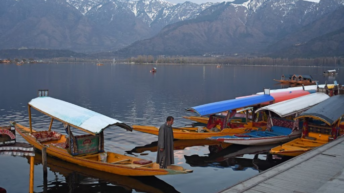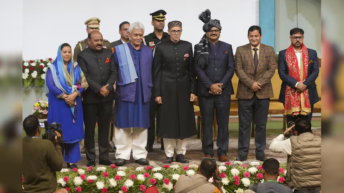|
Listen to article
Getting your Trinity Audio player ready...
|

US’ opposition
The United States of America is the most important of the 9 member states of the UN General Assembly that voted against the UAE and some Arab countries-sponsored resolutions recommending the Security Council to consider Palestine’s full membership of the UNGA. The resolution was finally adopted with 143 Ayes, 9 Nays, and 25 abstentions.
UNGA membership requires a recommendation from the Security Council. At the same time, the General Assembly has to determine whether Palestine is qualified for admission. The US is a member of the permanent-5 and enjoys the right to veto, along with other four permanent members. It is evident that at the level of the Security Council, the US will veto the resolution because she has already rejected it in the General Assembly. This has happened previously also.
Why veto?
The veto is a curse and negation of the fundamental principle of the prestigious international organisation viz, democracy. In a sense, veto power with the P-5 is the cancer eating into the vitals of the organization. Resorting to veto is perhaps the last chance for any one of the five super powers to safeguard its interests and priorities. Despite numerous debates in political circles the world over, a consensus on how to resolve the Palestinian issue could not be built.
The UN was the brainchild of the Anglo-American bloc during the days when the clouds of WW II were looming large over the globe. After that war, the UN lost its unifying approach to global issues against the Axis powers owing to the polarisation of the world community into two blocs. The UN got sandwiched between the two. Member countries chose their priorities. The split further deepened with the rise of China not only as the third power-centre but also as a mega economy that has the potential of dictating terms and reshaping the world economic order. China could make large monetary contributions to various organs and affiliates of the UN and also finance some of its major enterprises. It virtually bailed out the UN from imminent cash starvation at one point of time.
Demand for reform
Obviously, all these factors had their impact on what was being deliberated in the committee rooms of the UN. The organisation became a handmaid of the superpowers. Some seriously dedicated member countries were upset with the de-culturing of the UN. They seriously demanded a reform of the entire organization because they saw that the world had changed and that there were new political, social, and economic phenomena in the making.
A majority of members of the General Assembly are of the view that imbalances need to be removed as large unrepresented chunks of the human population should be given a proportional ability to voice the aspirations of the bulk of humanity in various organs of the UN at various levels, including its accredited affiliates. The foremost issue is a demand for the expansion of the Security Council by including some deserving countries as permanent members of the Security Council. India points out that every fifth man in the world is an Indian. How could she be kept out of the Security Council? Germany, Brazil, and South Africa, too, claim to have strong credentials for the membership of the SC.
But so far structural reforms of the Security Council (SC) and other subsidiaries are obstructed and even trivialised. The highly insulated SC has seen to it that the proposed reforms are stalled and the status quo is maintained. The P-5 and their supporters are genuinely sceptical about the world body strictly adhering to the democratic norms in finding solutions to issues related to world peace.
Grouping
Take, for example, the phenomenon of groupings that have come up within the fold or in affiliation to the UN. They have, unfortunately, tilted towards regional and sub-regional tendencies ignoring the universalism that is the sheet anchor of the United Nations Charter.
Grouping was fundamentally meant to synchronise and systematise the needs and aspirations of regional nations and peoples so that they would be welded into positive and creative teams but that has not happened. For example, the OIC, a body of 57 Islamic states formed with the objectives and aims of ameliorating the economic and social standards of the Muslims of the world has denied membership to India, a secular democracy that supports the second largest Muslim population in the world after Indonesia. What does it show? It shows that the service and uplift of the Muslims of the world is not the real objective of this organisation; there seems to be more than what meets the eye —- the lurking aspiration is to acquire more power in the UN out of the sheer number of its member-states.
Politicisation of the UN
Why do most of the UN resolutions have no teeth and receive scant attention? It is because of the misuse of the sanctions regime. It is because the UN surrenders to the veiled threats from superpowers, including their threats of stifling the economies of less influential nations.
One important aspect which has become a source of anxiety for those who expect much from this world body is its unacceptable policy of using kid-gloves with perpetrators of violence-related occurrences happening at different places on the globe. It uses different yardsticks for identical crimes. Let us be precise, When Russia attacked Ukraine, the UN rushed to pass a condemnation resolution against Russia, cleverly hiding the reason that Russia had to take unilateral action. But when Hamas launched an unprovoked barbaric attack on border villages of Israel on Oct 7, 2023, killing nearly 1200 innocent people, men, women and children, and taking many as captives, the UN found no urgency of passing a resolution condemning the Hamas attack. This amounts to group-ism and surrender to blackmail. Now, The UN and the so-called liberals (ironically including the US) are on their feet to demand a ceasefire in Gaza. How can it be justified? The plea is that Israel is using “more than justifiable” muscle power in Gaza in response to a terror attack.
Again, when India brought a complaint to the Security Council on January 1, 1948 that Pakistan had launched a massive attack on the Indian northern border state of J&K and should be asked to vacate the illegally occupied Indian territory, the UN, instead of delivering justice brought the aggressor at par with the aggrieved. Now pro-Palestine rallies are being started by college and university students in many parts of the US and UK. This is the gift of the ‘groupings’ now flourishing in the “liberal world”,
Tailpiece
Previously, India declined to sign the UN condemnation resolution against Israel because India could not forget what treatment the SC had given to the Kashmir issue but subsequently India changed its position. It is a fact that there is carnage and destruction in Gaza including Rafah. Spilling innocent human blood is not acceptable to Indian culture. The question is how to respond to a brutal and barbaric adversary without shedding innocent blood in these circumstances. We know India may have to shuttle between the two warring parties in the Middle East.
Washington has been somewhat inconsistent in its Middle East policy in the ongoing conflict. Facing the next general election in the US, Biden has been sending conciliatory signals to the Palestinians. Withholding the shipment of bombs to Israel is a message not only to the Palestinians but to the entire Muslim world as well. Washington knows no resolution is sustainable unless it emanates from an agreement between the two warring sides. Hence, the US government is in a bind between the supporters of Israel and the activists for Palestine at home and abroad.






Add comment